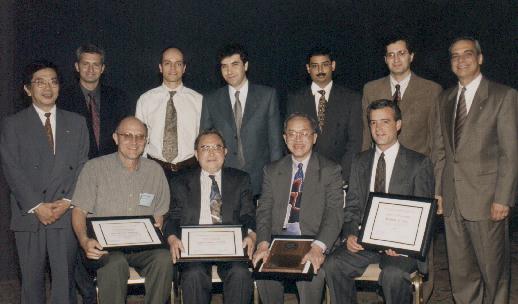

1999 Awards recipients with AACC Awards Chair M. Simaan and AACC President M. Tomizuka.
Standing from left: M. Tomizuka, S. Boyd, H. Hindi, B. Hassibi, S. Tatiraju, M. Soroush, and M. Simaan;
Sitting from left: D. Hrovat, K. Ogata, Y-C. Ho, and A. Teel
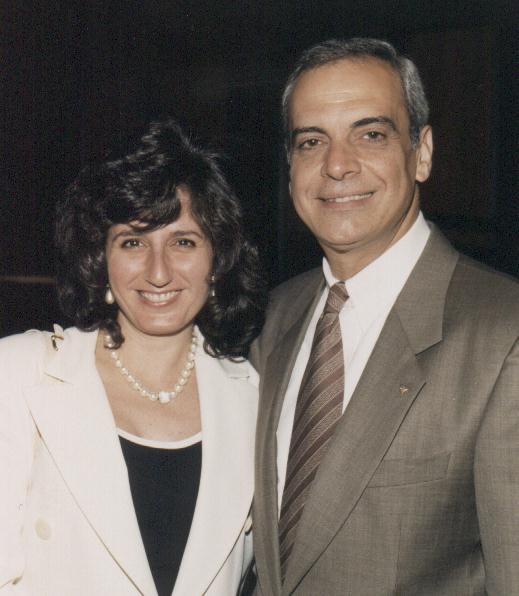
Awards Chair Dr. M. Simaan with his wife Rita during the 1999 Awards Banquet
 The Richard E. Bellman Control Heritage Award
The Richard E. Bellman Control Heritage AwardThe award is given for distinguished career contributions to the theory or applications of automatic control. The Bellman Control Heritage Award is the highest recognition of professional achievement for U.S. control systems engineers and scientists. Richard E. Bellman, for whom the award is named, was an applied mathematician who pioneered the development of system theory as an academic discipline in the 1950s and 1960s. His accomplishments are described in IEEE Transactions on Automatic Control, 1984. The Bellman Award is unique among the AACC awards in that it is made for lifetime contributions to control and systems engineering. Such contributions may cover a range of technical areas or may have been put into practice in several different fields. The winner of the Bellman Award usually has been involved with the interaction of control or system theory with other scientific disciplines, with the engineering profession, and/or with the implications of controls for society at large.
Awarded to Yu-Chi Ho for sustained and significant contributions to research and education in optimization and control of dynamic systems, and his establishment of a new branch of these fields, Discrete Event Dynamic Systems.

Prof. Ho receiving the Bellman Award from Prof. Tomizuka.
Yu-Chi (Larry) Ho received his S.B. and S.M. degrees in Electrical Engineering from M.I.T. and his Ph.D. in Applied Mathematics from Harvard University. Except for three years of full time industrial work he has been on the Harvard Faculty. Since 1969 he has been Gordon McKay Professor of Engineering and Applied Mathematics. Since 1989, he has been the T. Jefferson Coolidge Chair in Applied Mathematics and Gordon McKay Professor of Systems Engineering at Harvard. He was also the visiting professor to the Cockrell Family Regent's Chair in Engineering at the University of Texas, Austin in 1989
He has published over 140 articles and three books, one of which (co-authored with A.E. Bryson, Jr.) has been translated into both Russian and Chinese and made the list of Citation Classics as one of the most referenced works on the subject of optimal control. He is on the editorial boards of several international journals and is the editor-in-chief of the international Journal on Discrete Event Dynamic Systems. He is the recipient of various fellowships and awards including the Guggenheim (1970) and the IEEE Field Award for Control Engineering and Science (1989), the Chiang Technology Achievement Prize (1993). He is a Life fellow of IEEE, a Distinguished Member of the Control Systems Society, and was elected a member of the U.S. National Academy of Engineering (1987). In addition to service on various governmental and industrial panels, and professional society administrative bodies, he was the President of the IEEE Robotics & Automation Society in 1988 and co-founder of Network Dynamics, Inc., a software firm specializing in industrial automation.
His research interests lie at the intersection of Control System Theory, Operations Research, and Artificial Intelligence. He has contributed to topics range from optimal control, differential games, information structure, multi-person decision analysis, to incentive control, and since 1983, exclusively to discrete event dynamic systems, perturbation analysis, ordinal optimization, and computational intelligence.
 The Donald P. Eckman Award
The Donald P. Eckman AwardThe Donald P. Eckman Award was the first award established by the American Automatic Control Council. It was established in memory of Donald P. Eckman, who made important contributions to control theory and practice in the 1950s and 1960s but died tragically in an automobile accident in 1962. The purpose of this award is to recognize, particularly, important contributions to the control field made by younger researchers. The age limit for the award was originally set at 30 years, but was later extended to 35 years of age (at the time of the award) as the control field grew and matured, in recognition of the difficulty of making leading edge contributions to a more mature field. While the Eckman Award is given for key contributions made prior to the age of 35, the recipient is normally expected to be the type of individual who will remain a leader in the controls profession; he is an example to be emulated by engineers entering the profession.
The Eckman award is often given for key contributions to a single field of research, based on the discovery of a new phenomenon or design method or scientific principle. In practice, the award has usually been given to individuals who make theoretical contributions which have practical implications. However, the development of devices (e.g., as reflected by patents), or significant contributions to engineering practice, might also be recognized.
Awarded to Andrew R. Teel for his seminal work on control of systems with actuator limitations common in engineering practice, and his fundamental contributions to input-output theory for nonlinear dynamical systems.
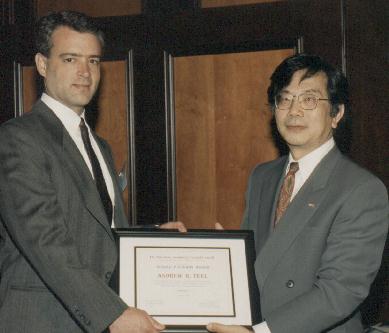
Prof. Teel receiving the Eckman Award from Prof. Tomizuka.
Andrew R. Teel obtained his A.B. degree in Engineering Sciences from Dartmouth College in Hanover, New Hampshire, in 1987, and his M.S. and Ph.D. degrees in Electrical Engineering from the University of California, Berkeley, in 1989 and 1992, respectively.
After receiving his Ph.D., Dr. Teel was a postdoctoral fellow at the Ecole des Mines de Paris in Fontainebleau, France. In September of 1992 he joined the faculty of the Electrical Engineering Department at the University of Minnesota where he was an assistant professor until September of 1997.
In 1997, Dr. Teel joined the faculty of the Electrical and Computer Engineering Department at the University of California, Santa Barbara, where he is currently an associate professor.
Professor Teel has received NSF Research Initiation and CAREER Awards, the 1998 IEEE Leon K. Kirchmayer Prize Paper Award, the 1998 George S. Axelby Outstanding Paper Award, and was the recipient of the first SIAM Control and Systems Theory Prize.
 The John R. Ragazzini Education Award
The John R. Ragazzini Education AwardThe AACC Ragazzini Award is given for outstanding contributions to Control Education in any form. These contributions can be from any source and in any media, i.e., electronic, publications, courses, etc. Due to the large number of well qualified nominees, this award is often one of the most difficult to assign.
In evaluating a nominee for the Ragazzini Award, it is common for the Award Committee to seek evidence beyond what is provided in the nomination, such as searching the Citation Index, or considering the leadership positions assumed by graduate students, or evaluating key research results of former graduate students. Education is viewed as a process which extends beyond the classroom or the advising functions of a particular faculty member. The Ragazzini Award has normally gone to university professors, but there is no formal requirement that nominees must be university professors. Accomplishments of former students may be considered in making the award.
Awarded to Katsuhiko Ogata for distinction over a period of thirty years in writing widely recognized system dynamics and controls textbooks, most notably, "Modern Control Engineering."
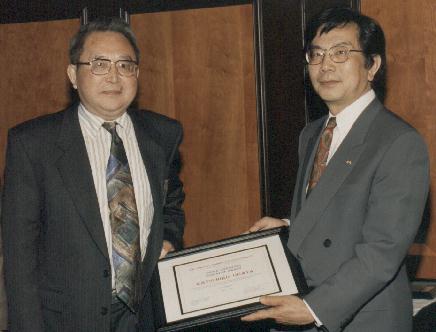
Prof. Ogata receiving the Ragazzini Award from Prof. Tomizuka.
Katsuhiko Ogata was born in Tokyo, Japan. He obtained a BS degree in Mechanical Engineering from the University of Tokyo. After receiving a BS degree he spent three years as a research assistant at the Scientific Research Institute in Tokyo, followed by two years of industrial experiences at the Nippon Steel Tube Company, Japan. In 1952 he received a Fulbright Travel Grant to come to the United States to get advanced degrees. He obtained an MS degree in Mechanical Engineering from the University of Illinois and a Ph.D. degree in Engineering Science from the University of California, Berkeley.
Soon after receiving a Ph.D. degree in 1956, he joined the faculty of Mechanical Engineering at the University of Minnesota to teach and do research in the field of control systems. While keeping his tenure at the University of Minnesota, he also taught control systems at the Electrical Engineering Department of the Yokohama National University, Japan for the total of three years.
K. Ogata authored seven textbooks, three of which have been published in multiple editions. His writing philosophy has been that undergraduate engineering students should not spend undue amount of time just deriving or verifying mathematical equations in control engineering. So he included in his books all necessary derivations and proofs so that the student can understand the materials of the books without struggling with mathematics. This approach was accepted quite well by the controls community throughout the world. As a result, most of his books were translated into foreign languages, such as Spanish, Portuguese, Japanese, Polish, Korean, Chinese, Bahasa Malaysia. Thus far, 20 foreign editions of his books came out.
While he was an undergraduate advisor some twenty years ago, his clear-cut and conscientious advising earned an Outstanding Advisor Award from the University of Minnesota.
He is a life fellow of ASME, members of Sigma Xi and Pi Tau Sigma. His biography appears in Marquis Who's Who in the World, Marquis Who's Who in America, among others.
 The Control Engineering Practice Award
The Control Engineering Practice AwardThe Control Engineering Practice Award is given to one individual or one team to be selected from those nominated for significant contribution to the advancement of control practice. The primary criterion for selection will be for the application and implementation of innovative control concepts, methodology, and technology, for the planning, design, manufacture, and operation of control systems. Achievement and usefulness will be evidenced by the benefit to society and by the degree of acceptance by those who use control as a tool. The work on which the nomination is based must have been performed while the nominated individual or at least one member of the team was a resident of the USA. The award consists of a certificate and an honorarium. In the event that the winner is a team, each member of the team will receive a certificate and the honorarium will be divided equally among the team members.
Awarded to Davorin D. Hrovat for outstanding contributions to the innovative practice of control engineering in the design of automotive control systems, encompassing transmission, engine, active suspension, and traction controls employed in thousands of automobiles worldwide.
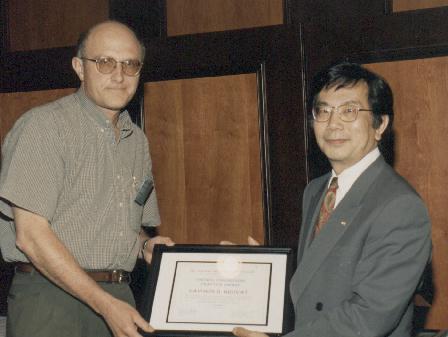
Dr. Hrovat receiving the Practice Award from Prof. Tomizuka.
Davor Hrovat received his Dipl.-Ing degree in Mechanical Engineering from the University of Zagreb, Croatia, and the M.S. and Ph.D. degrees in Mechanical Engineering from the University of California, Davis, in 1976 and 1979, respectively. Since 1981, he has been with the Ford Research Laboratory (FRL) in Dearborn, Michigan. At FRL, he is a Senior Staff Technical Specialist coordinating and conducting research efforts on different aspects of vehicle - power train dynamics and control, for which he holds numerous patents. He has served as an Associate Editor for the ASME Journal of Dynamic Systems, Measurement and Control, the ASME Applied Mechanics Review, and on the Board of Editors for the IEEE Control Systems Magazine. He is currently serving as an Editor for the IFAC journal Control Engineering Practice. He is a Fellow of the American Society of Mechanical Engineers, and the recipient of the 1996 ASME-DSC Innovative Practice Award.
 The O. Hugo Schuck Best Paper Award
The O. Hugo Schuck Best Paper AwardThe Best Paper Award is given for the best paper presented at the previous year's American Control Conference. In 1987 it was named after O. Hugo Schuck, a pioneer in the practice of flight control design at Honeywell, Inc., and later at NASA. This award was established with the purpose not only of recognizing technical contributions, but also the manner and effectiveness with which they are communicated to the community at the American Control Conference. There are no restrictions on the number, age, or affiliation of authors.
The main source of nominations for the Best Paper Award is submissions by attendees at the conference, who are provided with nomination forms at the registration desk to be used for the following year's conference. Nominations from other sources, following the conference, are also acceptable. Selection criteria include quality of the written and oral presentation, technical contribution, timeliness, and practicality.
Awarded to :
Srinivas Tatiraju, Masoud Soroush and Raj Mutharasan,
for their paper "Multi-Rate Nonlinear State and Parameter Estimation in a
Bioreactor," Proc. of the 1998 ACC, pp. 2324-2328.
and
Haitham A. Hindi, Babak Hassibi, and Stephen
P. Boyd,
for their paper "Multiobjective H2/H-Infinity Optimal Control via Finite
Dimensional Q-Parametrization and Linear Matrix Inequalities," Proc. of the 1998
ACC pp. 3244-3249.
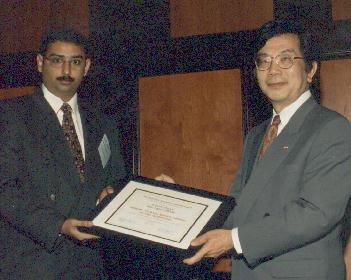
Dr. Tatiraju receiving the Schuck Award from Prof. Tomizuka.
Srinivas Tatiraju received the B.S. degree in Chemical Engineering from Andhra University, Visakhapatnam (India), in 1992, the M.S. degree in Chemical Engineering from the Indian Institute of Technology, Kanpur, in 1994, and the Ph.D. degree in Chemical Engineering from Drexel University, Philadelphia, in 1997. In 1998, he joined Kamdar Simulator Services, Houston, where he is currently a consultant to Honeywell Hi-Spec Solutions, Houston. His professional interests include state estimation, parameter estimation, mathematical modeling, and dynamic simulation.
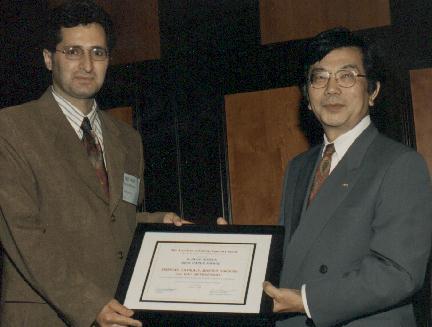
Dr. Soroush receiving the Schuck Award from Prof. Tomizuka.
Masoud Soroush is an Associate Professor of Chemical Engineering at Drexel University. He received the B.S. degree in Chemical Engineering in 1985 from Abadan Institute of Technology, Iran. He earned the M.S. degree in Chemical Engineering in 1988, the M.S. degree in Electrical Engineering (Systems) in 1991, and the Ph.D. degree in Chemical Engineering in 1992, from the University of Michigan, Ann Arbor.
His primary research interests are in nonlinear and adaptive control, constrained control, model predictive control, nonlinear state and parameter estimation, and polymerization reactor optimization and control. He has published more than sixty papers.
He received a Predoctoral Fellowship from the Rackham Graduate School at the University of Michigan in 1989, a Research Initiation Award from the Petroleum Research Fund in 1994, and a CAREER Award from the National Science Foundation in 1997.
Raj Mutharasan is the Frank A. Fletcher Professor of Chemical Engineering and currently Interim Dean of the College of Engineering at Drexel University. He obtained his B.S. in Chemical Engineering from IIT (Madras, India) in 1969 and Ph.D. from Drexel in 1973. After a post doctoral research year in the area of suboptimal control structures in distributed parameter systems at the University of Toronto, Canada, he joined Drexel University in 1974.
His current research interests are in high temperature materials processing, metabolic characterization of cell cultures, in-situ emission and fluorescence spectroscopy of cell culture, and gas-melt reaction pathway analysis. He has edited one research monograph, authored three chapters in research monographs, written over 90 reviewed publications, and received two patents in aluminum melt treatment. He has served as a technical consultant to a number of corporations in the areas of bioreactor monitoring and optimization, molten metal processing, and process control systems.
He serves on several national committees of AIChE and AIME-TMS. He served on the Editorial Board of Transactions of AIME- B, 1986 - 90. He received Drexel's Research Achievement Award in 1986, Lindback Teaching Award in 1988, and the Dow Chemical Award of Excellence in Teaching in 1985.
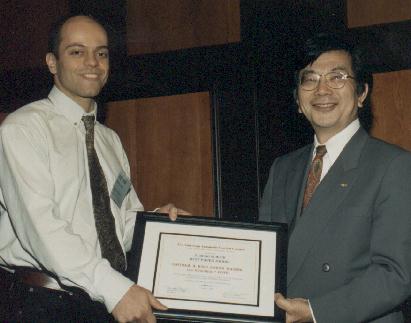
Dr. Hindi receiving the Schuck Award from Prof. Tomizuka.
Haitham A. Hindi was born in 1969. He received his B.Sc. in Physics in 1990 from Imperial College, and the M.S. in Electrical Engineering in 1992 from Stanford University, where he is completing his Ph.D. in Electrical Engineering. From 1991 to 1998 he was a research assistant at the Stanford Linear Accelerator Center, where he worked on control systems for electron beams in charged particle storage rings. Since April 1998 he has been with Quantum Corporation, working on control systems for magnetic storage devices. His research interests are multiobjective controller design, analysis and control of systems with saturation, robust convex optimization, and system identification.
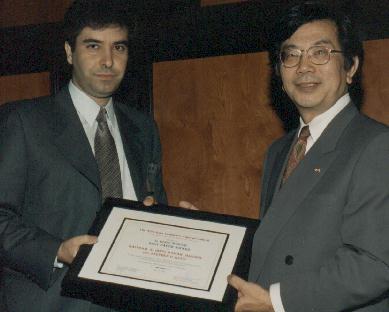
Dr. Hassibi receiving the Schuck Award from Prof. Tomizuka.
Babak Hassibi was born in Tehran, Iran, in 1967. He received the B.S. degree from the University of Tehran in 1989, and the M.S. and Ph.D. degrees from Stanford University in 1993 and 1996, respectively, all in electrical engineering.
From June 1992 to September 1992 he was with Ricoh California Research Center, Menlo
Park, CA, and from August 1994 to December 1994 he was a short-term Research Fellow at the
Indian Institute of Science, Bangalore, India. From September 1996 to October 1998 he was
a research associate at the Information Systems Laboratory, Stanford University, and he is
currently a Member of the Technical Staff at Bell Laboratories, Murray Hill, NJ. His
research interests include robust control and estimation, equalization of communication
channels, adaptive signal processing and control, and linear algebra. He is the co-author
of the forthcoming books: Indefinite Quadratic Estimation and Control: A Unified Approach
to ![]() and
and ![]() Theories (New York: SIAM, 1999) and State Space Estimation
(Englewood Cliffs, NJ: Prentice Hall, 1999).
Theories (New York: SIAM, 1999) and State Space Estimation
(Englewood Cliffs, NJ: Prentice Hall, 1999).

Dr. Boyd receiving the Schuck Award from Prof. Tomizuka.
Stephen P. Boyd received the A.B. degree in mathematics from Harvard in 1980, and the Ph.D. in Electrical Engineering and Computer Science from UC Berkeley in 1985. In 1985 he joined the Electrical Engineering Department at Stanford University, where he is now Professor and Director of the Information Systems Laboratory. He is the author of Linear Controller Design: Limits of Performance (Prentice-Hall 1991), Linear Matrix Inequalities in System and Control Theory (SIAM 1994), and technical articles on computer-aided control system design and convex programming applications in control, signal processing, and circuits.